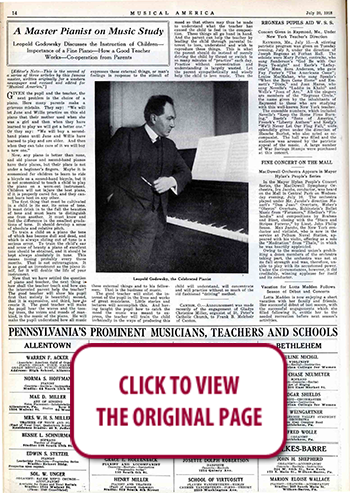 100 YEARS AGO IN MUSICAL AMERICA (249)
100 YEARS AGO IN MUSICAL AMERICA (249)
July 20, 1918
Page 14
A Master Pianist on Music Study
Leopold Godowsky Discusses the Instruction of Children—Importance of a Fine Piano—How a Good Teacher Works—Co-operation from Parents
[Editor’s Note—This is the second of a series of three articles by this famous master, written originally for a western newspaper and revised and edited for “Musical America.”]
GIVEN the pupil and the teacher, the next problem is the choice of a piano. Here many parents make a grievous mistake. They say: “We will let Jane and Willie practice on this old piano that their mother used when she was a girl and then, when they have learned to play we will get a better one.” Or they say: “We will buy a second-hand piano until Jane and Willie have learned to play and are older. And then when they can take care of it we will buy a new one.”
Now, any piano is better than none, and old pianos and second-hand pianos have their places, but their place is not under a beginner’s fingers. Maybe it is economical for children to learn to ride a bicycle on a second-hand bicycle, but it is not economical to teach a child to play the piano on a worn-out instrument. Children will not injure the best piano, if it is properly cared for, and they cannot learn best on any other.
The first thing that must be cultivated in a child is its ear, its sense of tone. It must drink in to the full the beauties of tone and must learn to distinguish one from another. It must know and feel the difference in the smallest gradations of tone. It should develop a sense of absolute and relative pitch.
To train a child on a piano the tone of which has become dull and dead, and which is always sliding out of tune is a serious error. To train the child’s ear and sense of beauty a piano of excellent tone should be obtained, and it should be kept always absolutely in tune. This means tuning probably every three months. That is not extravagance. It is as good an investment as the piano itself, for it will double the life of your instrument.
Now that we have settled the question of piano and teacher, the next thing is how shall the teacher teach and how can the interested parent help the teacher? The good teacher will show his pupil first that melody is beautiful; second, that it is expressive, and third, how to create it. The good teacher will make the pupil hear the waves and the tossing trees, the voices and moods of mankind, in the music of the piano. He will make the pupil understand how all music expresses these external things, or man’s feelings in response to the stimuli of these external things and to his fellowmen. That is the business of music.
The good teacher will enlist the interest of the pupil in the lives and works of great musicians. Little stories and lectures will accomplish this. And having taught the pupil how to catch the mood the music was meant to express, the teacher will train the child technically in the ways of producing this mood so that others may thus be made to understand what the teacher has caused the child to feel in the composition. These things all go hand in hand. And the parent can help the teacher by leading the child through parental interest to love, understand and wish to reproduce these things. This is what the parent should do instead of merely driving the child by threat or switch to so many minutes of “practice” each day. Practice without concentration and understanding is largely wasted. Let the parent sympathetically and wisely help the child to love music. Then the child will understand, will concentrate and will practice without so much of the old fashioned “driving” method.




 RENT A PHOTO
RENT A PHOTO





